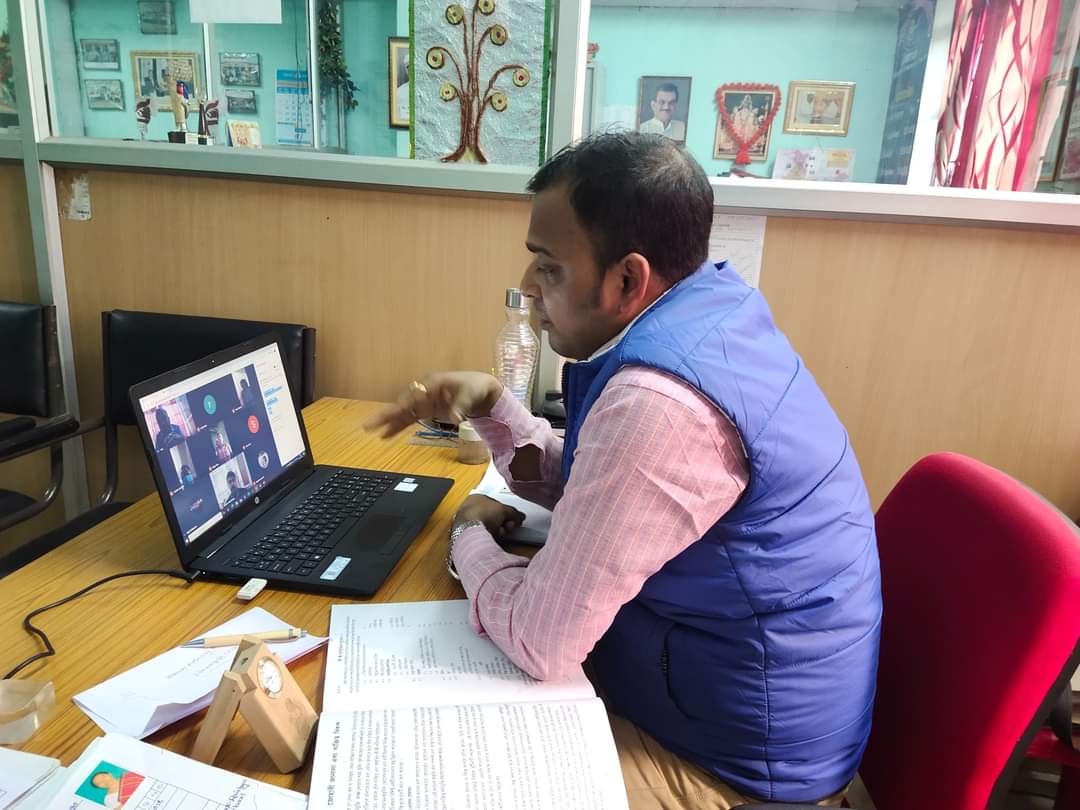Finance Management Papers & Publications
Post-merger profitability of selected banks in india
The present study aims to shed some light on the gains from consolidation exercise in terms of profitability of banks. Through the application of paired t-test, we arrived at the result that the consolidation of banks did improve the profitability of banks in India. The increase in profitability of banks under study is due to an increase in employee turnover and the subsequent reduction in operating expenses. Merger and acquisition programmes in Indian banks cannot be regarded as a false step if the benefits of it accrue to all stakeholders.
Breaking the gender bias in msme sector:a step towards social inclusion of women entrepreneurs in tripura
Gender financing is a typical issue now a days , women face so many challanges in obtaining financial support from bank . Practical social order,low confidence of Bankers on women ,bankers neglecting attitude in some cases discourage the women to come up with entrepreneurial idea or venture creation and thus women are legging behind men in business field .To integrate women in the mainstream development process ,the equality as well as equity is important to restrict gender discrimination .
Factors influencing social inclusion of women :a study on entrepreneurial support system in tripura
The research paper aims to find out the relevance of the existing support system for accelerating women entrepreneurship development and how these entrepreneurial support services of various Institutions expedite the process of social inclusion of women. The study has been conducted in the West Tripura District between January to August 2022. A total of 385 women entrepreneurs who were trained under government institutions were considered as the sample size. The primary data was collected directly from the field on basis of secondary information from Government Departments. The purposive sampling method has been deployed to identify the respondents for conducting the sample survey .
Roles of stakeholders towards project success: a conceptual study
Stakeholder plays significant roles in project success. They ensure clear communication of project goals, contribute to decision-making, and demonstrate commitment, increasing the likelihood of successful outcomes. They also act as advocates within their organizations, generating buy-in and support. The main purpose of this paper is to identify and discuss the roles of shareholders in a project success. The paper is conceptual in nature and uses a number literatures ranging from 2007 to 2023 from a good number of journals. After scrutinized the literature review, the paper concludes a number of findings. The findings implies that stakeholders in a project is crucial for its success and sustainability. Stakeholders play a significant role in ensuring the performance of the project. Project managers need to acquire stakeholder management skills to address the communication requirements of stakeholders. This is important for the success of the project. The paper recommend that policymakers, practitioners and academia have to ensure the expectations and make a balance among the stakeholders.
Project failure and stakeholders reaction: a conceptual study
Effective project management requires an understanding of how stakeholders are impacted by project failure. It draws attention to the effects on those involve finances, reputations, and emotions, assisting organizations in risk avoidance and fostering stakeholder satisfaction, trust, and long-term success. The purpose of this study is to provide proactive risk management, stakeholder involvement, and project result strategies. In order to compile this study, we have used a number literature reviews ranging from 2004 to 2023. The study's findings show that project failure results in significant financial losses, harms reputation, has legal ramifications, affects employee wellbeing, stifles relationships with stakeholders, stifles innovation, and endangers communities and the environment. By Adopting proactive risk management, strong governance, open communication, employee support, stakeholder involvement, strategic resource allocation, and social and environmental responsibility to reduce these negative effects and achieve sustainable project outcomes. The policymakers, practitioners and academia should focus risk factors those are associated with the project failure and hance manage a good harmony among the stakeholders.
Effects of triple constraints on project success: evidence from bangladesh
Project management plays significant roles to the success of the project. The aim of the study is to review and analyze latest literature on the effects of triple constraints on the project outcome. The study is based on the secondary method whereas literatures are collected form the google scholar ranging from 2010 to 2023. After reviewing the literature, the study concludes a number of findings. The quality of the project is highly depended on the time and budget. However, inadequate management, stakeholders involvement are also play crucial roles towards project success. The study concludes a number policy recommendations.
Bridging the digital divide: understanding consumer awareness towards cyber security in rural and urban communities
In an era of rapid technological advancement, the digital divide between rural and urban communities has become increasingly apparent. This study aims to investigate consumer awareness towards cyber security in both rural and urban settings, recognizing its critical importance in safeguarding personal and sensitive information. The study underscores the urgent need for targeted interventions to bridge the digital divide in cyber security awareness. Policymakers, educators, and community leaders must collaborate to implement initiatives tailored to the unique needs of rural populations, including improving access to technology, enhancing digital literacy programs, and fostering a culture of cyber security consciousness. By addressing these disparities, we can strive towards a more inclusive and resilient digital society where all individuals, regardless of their geographic location, are empowered to navigate the digital landscape securely. This research paper delves into the awareness and attitudes of consumers regarding cyber security in both rural and urban settings. With the increasing prevalence of online activities, particularly e-commerce, understanding the level of awareness and concerns about cyber security is crucial. The study analyzes data collected from 100 respondents, examining demographics, online shopping behavior, encounters with security issues, familiarity with safety measures, and sources of information about cyber security. The findings provide insights into the digital divide between rural and urban communities and offer recommendations for enhancing cyber security awareness and education.
The risk perception as a mediator between herding and overconfidence on investment decision by gen z in indonesia
Behavioral finance theory highlights how psychological factors can lead to poor investment decisions, which may threaten investors' trust in the stock market, discourage investments, and hinder economic growth. This study aims to examine how behavioral finance factors, particularly herding bias and overconfidence bias, influence investment decision on the Indonesia Stock Exchange through risk perception. The research was conducted using an online questionnaire distributed to 120 Gen Z stock investors and analyzed using PLS-SEM. The results show that herding and overconfidence biases have a significant positive influence on risk perception. Both herding and overconfidence biases have indirect positive influences on investment decision through risk perception. Although overconfidence bias and risk perception can directly affect investment decision, herding bias fails to do so. These findings highlight the importance of considering an individual's behavioral biases and risk perception, while policymakers should devise strategies to mitigate their impacts; so that investors can benefit from investing, which may eventually lead to the growth of the national economy.
Performance appraisal of andhra bank and its role in financial inclusion
Right of entry to finance, especially by the poor and susceptible groups, is an essential indispensable for employment, economic development, poverty mitigation and social up-liftment. Here lies the importance of financial inclusion. Financial inclusion or inclusive financing is the deliverance of financial services at affordable costs to sections of disadvantaged and low income segments of the society. The Government of India has taken a number of initiatives so that the banks can serve the poor in a hassle-free manner. With a view to spreading the services to poor and weak groups Andhra Bank plays a vital role in financial inclusion. Keeping this view, the authors have attempted to discuss the role of Andhra Bank towards Financial Inclusion as the main purpose of this paper. It also analyses the performance of the Andhra Bank in terms of its deposits, advances, income, expenditure, profitability etc..
Customer perceptions on inclusive banking practices – a study with reference to andhra bank
Financial Inclusion is emerging as a new paradigm of economic growth that plays major role in driving away the poverty from the country. It refers to delivery of banking services to masses including privileged and disadvantaged people at an affordable terms and conditions. Financial inclusion is important priority of the country in terms of economic growth and advances of society. It enables to reduce the gap between rich and poor population. In the current scenario financial institutions are the robust pillars of progress, economic growth and development of the economy. When and where all citizens are participated in financial system, the economy and system will become very strong. In this regard the research article was focuses on customer perceptions towards inclusive banking practices.
Artificial intelligence and the future of business: strategic perspectives for viksit bharat@2047
Artificial Intelligence (AI) is redefining the future of business by transforming traditional processes, driving innovation, and fostering sustainable growth. This research paper explores the strategic integration of AI in Indian business ecosystems, aiming to identify its role in achieving the vision of Viksit Bharat@2047. The study emphasizes how AI can accelerate economic growth, enhance productivity, and address pressing challenges across sectors such as manufacturing, services, startups, and agri-business management. Using a mixed-methods approach, the research combines qualitative insights from industry experts and quantitative data analysis to assess the readiness and impact of AI adoption in businesses. Key findings indicate that while AI technologies have immense potential to streamline operations, optimize supply chains, and drive decision-making, several challenges persist, including skill gaps, ethical concerns, and infrastructural limitations. The study underscores the importance of leveraging AI for sustainable development, employment generation, and global competitiveness. Policy recommendations focus on fostering an innovation ecosystem, strengthening governance, and investing in upskilling initiatives to ensure inclusive growth. By aligning AI strategies with Indian Knowledge Systems, this research provides actionable insights for businesses, policymakers, and stakeholders committed to shaping a technologically empowered India by 2047.
Ogunbodede Adedeji David
Augustine University Ilara Epe, Lagos, Nigeria
Parveen S
Jntua, Aicte
Rajnandani Kumari
Banasthali Vidyapith
Most Popular Category
- Pharmacy (270)
- Education and social science (224)
- Pharmacology (223)
- Pharmacognosy (178)
- Business management (147)
- Pharmacology and toxicology (134)
- Education and training (131)
- Pharmaceutical sciences (130)
- Medicine (129)
- Research (123)
- Health Science (100)
- Biological Sciences (99)
- Management (98)
- Computer Science (93)
- Public health (91)
- Computer Science Applications (86)
- Human resource management (83)
- Engineering (77)
- Accounting and finance (73)
- Information technology (69)
 Akhil Antony
Akhil Antony  Md. Abdur Rahman Choudhury
Md. Abdur Rahman Choudhury  L
L